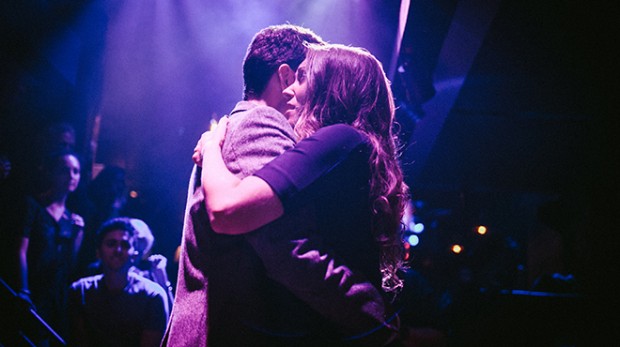You have no items in your cart. Want to get some nice things?
Go shopping
One of New Yorkers’ most deep-seated existential phobias – or so the stereotype goes – is FOMO: fear of missing out. Every avenue taken is an opportunity lost; every relationship committed to is a bevy of bedmates left behind. To settle down, for many of the twenty-somethings imbibing at Lower East Side bar Fat Baby during Play/Date, is simply to settle.
Few theatrical productions explore FOMO as intelligently as Play/Date. One of the rare immersive theatrical productions where form – in this case, the freedom to wander voyeuristically through Fat Baby’s three levels and listen (or look) in on various conversations of the in-person and technological variety – seems to follow organically from content (twenty-five encounters falling somewhere under the nebulous “date” umbrella). As audience members, are invited to follow as many or as few “scenes” as interest us in each of Play/Date’s three acts; the physical layout of Fat Baby makes it impossible to see more than a third of what’s going on. We start watching one scene: all the while craning our necks to see if there’s a more attractive prospect, a more intense encounter, a few feet away.
But the anxiety we’re feeling is nothing compared to the anxiety of our characters. Each of the pairs (and drunk-texting singles) that comprise Play/Date is – to a greater or lesser extent – terrified. “B” (Sharon Counts) in Joe Salvatore’s “Mother’s Milk”, nearly sabotages a promising date with her insistence that she’s not worth dating. Kerry (Penny Middleton), in Clay McLeod Chapman’s “Pump and Dump”, is painfully aware that her toddler son diminishes her value on the all-too-competitive dating market. The faux-lovers (Elle Anhorn and Laura Delhauer) in Emily Kaczmarek’s “Insta” know that the Instagram romance they’ve concocted to inflame their respective exes may, with a few more posts, turn real.
It’s a testament to the skill of director/designer Michael Counts that the twenty-five plays – by several different writers – feel like such a unified whole. With rare exceptions (“Redux,” by Claire Kiechel, is powerful in its own right but slightly more self-consciously theatrical than other scenes; the fact that its characters are credited as “Thorvald” and “Nora” hardly comes as a surprise), the pieces feel utterly – and artfully – naturalistic: the pauses and false starts and awkward digressions all the more wrenching for how realistic the dates seem.
That realism, though, is expertly controlled. Voicemails from an woman waiting for an increasingly late date punctuate each of Play/Date‘s three “acts”; a romance between the two bartenders on duty (and de facto show MCs) proves a quietly narrative through-line: a wider story arc that lends emotional heft to the shorter encounters. Several of the storylines are told exclusively through text-message (or Grindr): phone screens projected behind characters’ heads: these range from the too-familiar (an ex-boyfriend drunk-texting his girlfriend in Blake McCarty’s “Ancient History”) to the genuinely chilling (a guessing game between prospective Tinder dates turns bona fide frightening in “WYSIWYG” by Clay McLeod Chapman).
The scenes’ lengths are variable, meaning that by the end of each act, we’re all brought back from our disparate storylines to focus on a single exchange: a technique that’s used to particularly strong effect with Act III’s “The Secret to a Healthy Relationship”, by Jamie Roach. Initially a blackly hilarious breakup story, it’s heartbreaking precisely because, as unlikeable as its doomed leads may be, we’ve all been sitting awkwardly at that table: drawing out an agonizing conversation because we’re terrified of what will be left when it ends.
It is precisely this blend between cynicism and empathy that makes Play/Date so surprisingly moving. For all its jabs at the lonelyhearts that line the bar stools, its throwaway hyper-topical references (most of the jokes in Play/Date rely upon an audience awareness that the typical patron of Fat Baby does not drink port or live in Sheepshead Bay), its exuberant celebration of FOMO-induced hypergamy, Play/Date is looking to get serious. Its stories are about people falling in love, exchanging intimacies, pulling back in fear of having exposed too much only to realize that they might not be the only ones to worry about how to survive being vulnerable.
It’s impossible to see more than a third or so of Play/Date at one show. But it’s worth ignoring the show-induced FOMO and committing to watching any given scene all the way through: watching two people slowly, tentatively fall in love proves more rewarding than mindlessly meandering through the bar.
As for me, I’m planning a second date.
Play/Date continues at Fat Baby until December 31.

About Tara Isabella Burton
Tara Isabella Burton's work has appeared or is forthcoming in Arc, The Dr TJ Eckleburg Review, Guernica, and more. In 2012 she received the Shiva Naipaul Memorial Prize for travel writing. She is represented by the Philip G. Spitzer Literary Agency of New York; her first novel is currently on submission.




